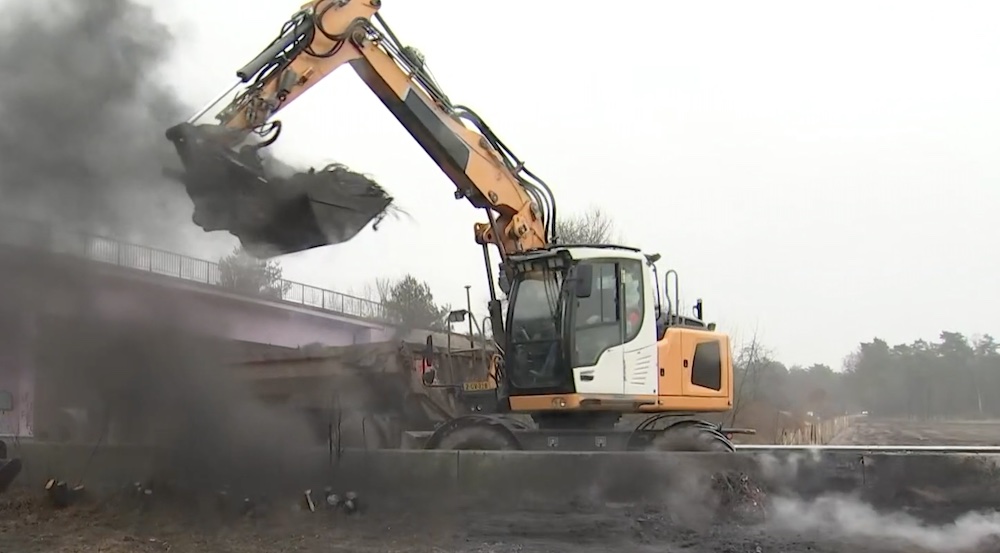The small Belgian village of Postel, located in the province of Antwerp, has recently become the scene of a growing dispute between Belgian and Dutch farmers.
A conflict has arisen between Belgian and Dutch farmers in the border region near Postel. The cause of these tensions lies in actions by Dutch farmers who, according to Flemish colleagues, have dumped waste and tires and even set them on fire on Belgian territory. These incidents have led to a heated situation, in which Flemish farmers were forced to take action.
The spokespersons of the Flemish farmers have expressed their dissatisfaction about the actions of their Dutch colleagues. “The Dutch colleagues came here to stir things up a bit and dump their waste, but we already have names and license plates and they are being summoned by the Dutch Defense Force,” said one of the Flemish spokespersons in Postel.
The Flemish farmers emphasize their desire to keep the protests peaceful and respectful. As a spokesperson put it: "We have now cleaned up a bit and will soon add some more tractors. We feel that we should do it peacefully, for public opinion, but also for ourselves."
Meanwhile, public opinion seems mixed on the events. Although there is understanding for the farmers' views, there is less support for the way some protest. Blocking the highway and other actions lead to division among the population. The response of European leaders so far seems to have been limited to recognition and sympathy for the farmers' grievances, without concrete proposals to address their problems.

In the Netherlands and Belgium, the actions have led to the closure of some border crossings, such as the A67 near Eersel, although some, such as the A16 near Hazeldonk, have now reopened. Dutch farmers have joined their Belgian colleagues in a gesture of solidarity and common discontent. These blockages have caused significant traffic disruptions and are a sign of the growing unrest among European farmers.
The Flemish farmers emphatically distance themselves from the actions of the Dutch farmers. “Our aim is not to run amok or to cause vandalism or the like,” explains a Flemish farmer. Which indicates a difference in approach and tactics between Flemish and Dutch farmers.
Furthermore, it has been reported that there has been no direct contact between Belgian and Dutch farmers, which may have contributed to the misunderstanding and escalation of the conflict. However, the Flemish farmers emphasize their willingness to take further action, realizing that the problems on the table cannot be solved in one day.
This conflict between Belgian and Dutch farmers in the border region sheds light on the complexity of agricultural issues and the tensions that can arise between different groups within the sector. It shows how quickly misunderstandings can lead to conflicts and how important communication and cooperation are to find solutions.
blockages
Farmers have blocked several key border crossings in response to what they see as unjust treatment and demands from the European Union, particularly in relation to the Green Deal and fertilizer regulations. These actions are part of a wider European farmers' protest, stretching from France to Greece and Poland, with farmers expressing their frustration over low prices for their products, rising costs, cheap imports and restrictions imposed by the EU in the fight against climate change.
The actions have not been limited to roadblocks. Violent confrontations broke out in Brussels, with farmers throwing eggs and stones at the European Parliament and setting off fireworks. Their demands center on an overhaul of the EU's Common Agricultural Policy (CAP), which they see as too ecological and not supportive enough for food producers.
The situation in the port of Zeebrugge is also noteworthy, where a blockade that started on Wednesday has seriously hampered freight traffic, resulting in long queues of trucks. This port is a major transit point for car imports and fresh produce from Great Britain and other regions. The blockade has caused significant disruptions in the logistics chains of several major car manufacturers.
Image: VRT NWS – view: the Belgian farmers explain why things were just above arm for the Dutch farmers




